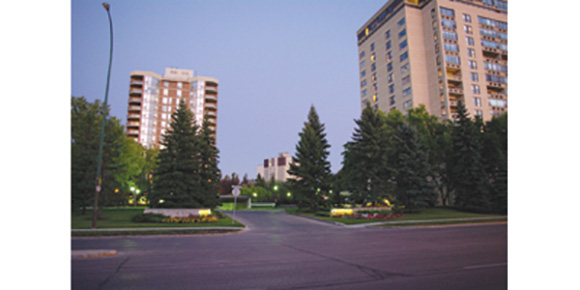by Robert L. Tyler
New condominium legislation came into effect on February 1 of this year. Those selling condo properties now have a greater obligation to disclose financial and other condo corporate and governance related information. Sellers must now dig deeper to assemble a complete disclosure package that sets out the full legal status of the unit being sold, as well as the common elements and the governance aspects of the condo corporation itself.
Many people don’t realize that when they buy a condo, they are also buying into a co-ownership arrangement of the entire building and property with all of the other condo owners in the complex. The owners, collectively, become responsible for the short-term maintenance and eventually the long-term capital replacement of the common parts of the condo complex as a whole. This has always been the case, but the enhanced disclosure requirements entitle the buyer to a greater depth of documentation and information, enabling them to more carefully analyse what they are getting into.
Perhaps, one of the most important things to look at when purchasing a condo unit is the extent of the deferred maintenance in the complex as a whole in relation to how much money is in the condo corporation’s reserve fund account. The reserve fund is an account set aside by the condo corporation for the larger repair and maintenance items anticipated in the future.
The new legislation requires a reserve fund study of the entire complex (not the individual condo units) to be conducted by an outside professional such as an architect, engineering firm, AACI (accredited appraiser) or others with expertise in analysing building components and associated financial information. Under the new legislation the reserve fund study report must establish an ideal balance for the reserve fund account, and when it is underfunded, suggest a “plan” to mitigate the deficit. Previously, there has not been such a requirement.
Condo sellers and purchasers are now confronted with the reality that some of the condo projects may be seriously underfunded. With a reserve fund study in hand, a more careful analysis can be made by a prospective buyer before the decision to buy is beneficial.
If you are considering purchasing a condo, ask your REALTOR® if a reserve fund study is available for the building you are looking at.
The new legislation requires all condominium corporations in Manitoba (approximately 1,200 of them) to obtain a reserve fund study that reports on the deferred maintenance specifics of the building by February 1, 2018. There are no exemptions. Many condo corporations have already commissioned their study, others are in the process, and some haven’t even started.
If you are considering purchasing a condo that has not yet produced a reserve fund study, it is recommended that you retain the services of an outside engineering or building inspection professional to examine the larger components of the condominium common property to consider the overall condition of the building and grounds.
Without a reserve fund study, most people will require outside assistance to help determine if the amount held by the condominium corporation in its reserve fund is adequate. If it is underfunded, the money to pay for future repairs, replacements and upgrades of the common elements must be collected from the pockets of all unit owners in the complex. Depending on the size of the condominium project and the number of unit owners (and the percentage ownership interest of each), it may not be that onerous to build up the reserve fund over a short period of time in monthly payments, but buyers should undertake a careful analysis of that aspect before deciding to buy.
The status of the reserve fund account in relation to the reserve fund study is a factor that will affect the market value of the condo.
It should be no different if you were buying an existing home. It is prudent to have a home inspection done by a qualified inspector to determine the extent of any deferred maintenance. With a proper inspection report in hand, the home buyer is able to budget for how much should be set aside each month for future maintenance and capital replacement requirements.
Likewise, when buying a condo, the new legislation almost forces the issue in its aim towards ensuring a reserve fund study for the common elements is available, and an ideal balance in the reserve fund account is being built up to meet future needs.
Well-managed, well-maintained and adequately-funded condominium projects are out there.
All buyers of condos now have seven days to examine an extensive set of disclosure documents before becoming legally obligated to proceed with the purchase. It is recommended that once buyers enter into a purchase agreement to buy a condo, they make an appointment with their lawyer to review all disclosure documents before the seven days expire to ensure any decision to purchase the particular unit can be carefully analyzed from a legal perspective. With the new legislation in effect, and a current reserve fund study in hand, there will be less guessing and more information available.
Don’t be thrown off buying a condo because of the new legislation. It is there to ensure valuable information is disclosed so that buying decisions can be made in a more informed way.
Use it to your advantage. It may be a good time to buy, however it is important to analyse and understand the disclosure documents to make an informed decision. A REALTOR® experienced in condo sales can be of great assistance in helping you get started. It may be a good time to buy a condo.
NOTE: This summary is of a general nature only and is not exhaustive of all possible legal rights or remedies, which may vary in the circumstances. Readers should consult their own legal representatives for specific advice on similar matters.
(Robert L. Tyler is a partner with the law firm Aikins, MacAulay & Thorvaldson LLP and practices in the area of real estate law.)



